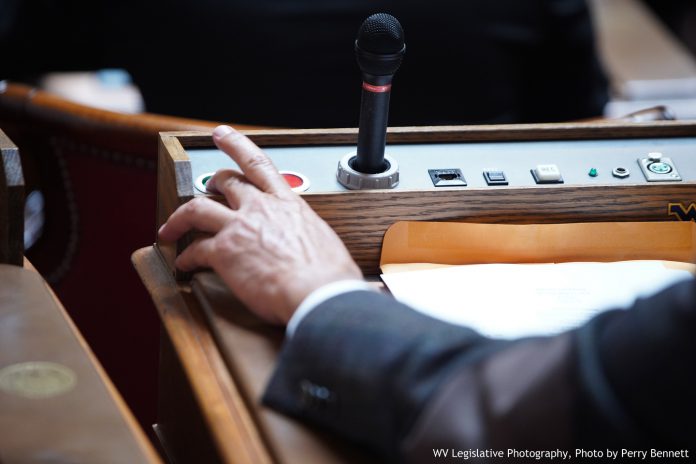As of 4 p.m., Wednesday, January 19th, 2011, the eighth day of the 80th Legislature’s 1st Regular Session, 648 bills have been introduced in the House of Delegates. Of those, two passed and have been sent to the Senate for consideration. The bills passed by the House were:
House Bill 2001 would limit the authority of the Parole Board to consider releasing an inmate serving a life sentence who has qualified for release on parole, to once every three years.
House Bill 2464 would expand reporting requirements under the State Ethics Act to include information relating to the spouse of the public servant, and adds reporting of business interests that the public official is employed by or furnishes services to. The bill also prohibits some public servants and employees from registering as a lobbyist for a period of time following the end of their public employment.
A Sampling of Bills Introduced In the House
House Bill 2029 would increase the amount of annual and incremental salary increases for eligible state employees from $60 to $100.
House Bill 2045 would add “sexual orientation” to the categories covered by the Human Rights Act, prohibiting discrimination in employment and places of public accommodations. This bill would also add “age” and “sexual orientation” to the categories covered by the Fair Housing Act prohibiting discrimination in housing.
House Bill 2056 would create the West Virginia Renewable Energy Act. It would provide a maximum $2,000 investment cost recovery incentive for customer-generated electricity from renewable energy systems, but exempt electric and gas companies from qualifying for that incentive. The bill would also provide a $25,000 maximum tax credit for electric light and power companies that purchase customer-generated electricity.
House Bill 2099 would provide a five percent increase in teacher’s salaries for each of the following school years, 2010-2011, 2011-2012, 2012-2013, and also add pay increments for certain teachers.
House Bill 2129 would provide a mandatory sentence of 15 years for any person who maliciously shoots a police officer on duty, while providing a mandatory sentence of 10 years for any person who unlawfully, but not maliciously, shoots a police officer on duty.
House Bill 2159 would prohibit members of the news media from being compelled to give testimony in any court in the state relating to the source of information in the public communication without the consent of the person or persons providing the information relied upon for the public communication.
House Bill 2161 would create the Herbert Henderson Office of Minority Affairs. This office would provide a forum for discussion of issues that affect the state’s minorities. The office would also provide recommendations to the Governor and the Legislature regarding the most appropriate means to provide programs and services to support minority groups in the state.
House Bill 2201 would provide for a comprehensive drug and alcohol free program for miners. Mine operators would be eligible for a credit on their workers’ compensation premiums if they have established a drug and alcohol free mine workplace as provided in the bill. The bill requires proof of drug and alcohol free status in order for miners to be certified. Mine inspectors are required to receive training in drug and alcohol abuse and a statewide database of miners failing to provide proof of alcohol and drug free status would be established.
House Bill 2394 would protect academic speech of professional educators. This legislation would provide that an employee in West Virginia public schools or a higher education institution may not be disciplined, denied employment or denied promotion or tenure based upon his or her speech, research or writing related to public issues The bill would not protect speech or actions that constitute a crime.
House Bill 2437 would require that all cutter heads, long wall shears and other mining machines automatically shut-off when the methane level reaches one percent.
House Bill 2440 would allow the Division of Energy to develop an energy related public relations campaign focused on educating Washington, D.C. area and the federal government about West Virginia coal.
House Bill 2490 would prohibit the use of a mobile communication device to engage in text messaging or additional technologies while operating a motor vehicle. A person found in violation of this measure, if convicted, would be guilty of a misdemeanor and fined no more than $250 for a first conviction.
House Bill 2514 would require reclaimed strip mines to be populated by plants that are beneficial to the local bee population.

